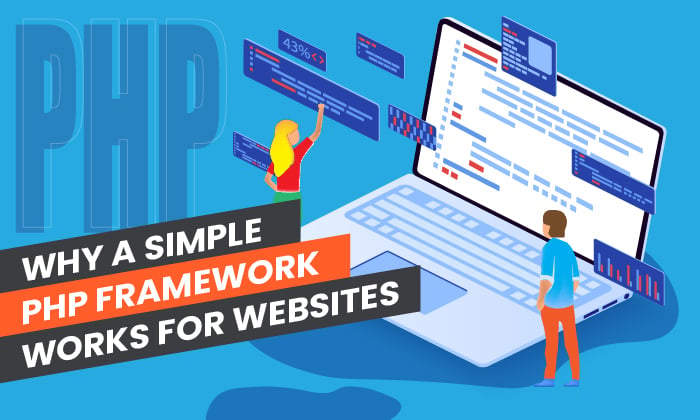
As a developer, chances are you’re always looking for ways to improve your website’s functionality or create a more dynamic experience for your audience.
Typically, you might rely on languages like HTML and JavaScript. However, there’s another cool processing language that could improve your site structure called PHP.
With PHP, you can reduce development time and streamline your coding, while improving the user experience. Does this mean you need to build out a whole app from scratch, though?
Nope. The best (and most efficient) way to use PHP is through a simple PHP framework. Here’s how these templates work and a look at some frameworks you might choose from.
What Is a Simple PHP Framework?
First, PHP, or “Hypertext Preprocessor,” is a programming language you can use to improve websites. Web developers use it to build PHP applications and services to make websites more interactive, for example, by adding web polls.
To build PHP apps, developers use PHP frameworks. These templates typically include prebuilt components which allow developers to speed up the process.
What’s a “simple” PHP framework, then? Well, the clue’s in the name: it’s a simple, streamlined version of a typical PHP framework. You might use it to build, for example, interactive web apps, and so on.
Here’s an example of what some basic PHP code might look like:
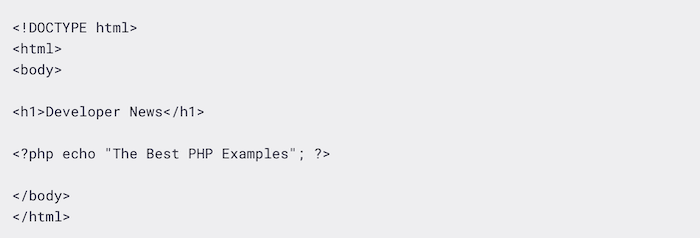
Essentially, simple PHP frameworks help you build solid programs without composing huge amounts of code. They allow you to get fully-functioning apps up and running quickly, which is precisely what we’re aiming for when trying to start and grow a business.
Want to find the source code for this framework? It’s hosted over on GitHub. However, it might be easier and faster to use a simple PHP framework that is already packaged and ready to go. We’ll cover a few of those a bit further down.
Reasons to Use a Simple PHP Framework for Websites
If you’re not sold on PHP frameworks yet, or if you’re still unclear on why they’re useful, here are just some of the reasons why you should give a simple PHP framework a try.
1. Simplified Coding
As a programming language, PHP can be tricky. If you want to introduce new concepts or, for example, improve a website’s functionality, you need to write long and complex lines of code.
This is where the template comes in. With a simple PHP framework, you can quickly generate the code you need, which helps you build impressive PHP apps with little coding experience.
2. Quicker Development
Here’s what else is great about simplified coding: it’s a time-saver!
Rather than spending time writing repetitive code or building out apps from scratch, you can let the framework generate the code for you. As a result, you can focus your time on business and app marketing, rather than coding.
3. Increased Security
At its core, PHP is fairly secure. However, as with any programming language, it’s easy to accidentally write in vulnerable code, especially if you rely on outdated tutorials or guidelines.
Frameworks provided by reliable platforms are constantly tested for vulnerabilities and updated where necessary, so your apps will be as secure as possible.
4. Easier Maintenance
It’s much easier to maintain your application if you have a clear template to follow, which is where the PHP frameworks really help.
Not only do PHP frameworks include documentation to help run your apps smoothly, but developers are constantly building community libraries to help other programmers manage their code more efficiently, which allows for easier maintenance.
5. Improved Teamwork
If you’re programming alone, it’s simple to keep track of the code as it develops. However, it’s challenging (not to mention time-consuming) for new team members to come in and learn your whole code from start to finish.
A PHP framework boosts collaboration. With a template, your team can quickly skim the template and understand how it applies to your particular application.
Simple PHP Frameworks to Try
OK, so that’s what a simple PHP framework is and why you might use one.
How do you pick a framework for your needs, though? To help you get started, here’s a selection of simple PHP frameworks, each with slightly different benefits.
1. CodeIgniter
If you’re a newbie looking to make your website more dynamic or build some functional apps, check out CodeIgniter. From creating simple news items to complex web services, CodeIgniter can help you out:
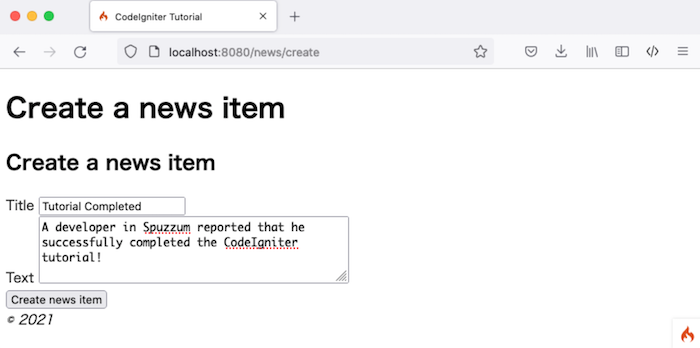
Lightweight and nimble, CodeIgniter is a simple PHP framework aimed at developers who want to create scalable apps without a fuss. There’s very little configuration involved and it comes with clear documentation, so you can be up and running in no time.
Compared with similar frameworks, like Laravel, it’s easy to learn and simple to navigate, but it’s no less impressive. Give it a try if you want to build on a comprehensive framework without taking up too much space on your device.
2. Laravel
Do you want to build a scalable, sophisticated app with advanced features? Then consider Laravel.
Laravel is all about providing a great experience for those looking to innovate and develop apps quickly. It’s based on a neat, elegant structure, and you can quickly generate skeletal templates to build into complex apps without compromising on quality or security.
What’s great about Laravel is how scalable and flexible it is. The entire framework is designed to “grow” with your business, so you can rapidly scale your apps as your audience grows.
Whether you run Mac, Windows, or Linux, it’s simple to launch Laravel and get building. That said, it’s not the easiest PHP framework to learn, so new developers might prefer other templates.
3. Phalcon
Do you need a framework to help you build a high-performing website? Phalcon might be an option for you.
Phalcon is all about low-level architecture. The framework prioritizes performance and speed over complex configurations, so it’s one of the fastest PHP frameworks out there and offers a sleek, streamlined coding experience:
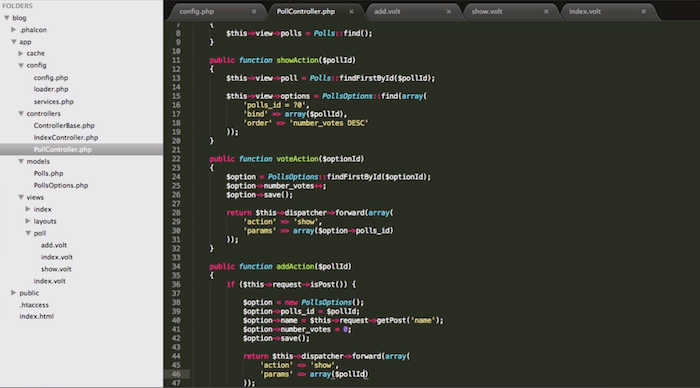
Why is it so fast? It’s all about memory usage. Phalcon is “memory-resident,” meaning you can load it once, and it runs continuously in the background. It’s ready and waiting whenever you need it, so you can work quickly and efficiently.
What’s more, it’s flexible enough for either small app developers or enterprise-level designers. You’ll also find a great range of documents, screencasts, and tutorials for more help when you need it.
The takeaway? Phalcon is an option if you need a fast framework with a little freedom to configure your own directories.
4. Yii
Are you new to coding and seeking a simple PHP framework to learn the ropes? Then check out Yii.
Yii, which translates to “simple and evolutionary” in Chinese, aims to streamline web app development. What does this mean? Well, the base code is fairly simplistic. However, this is why Yii stands out.
It’s essentially a universal template, meaning you can use it to build a whole host of different PHP web apps. All you do is add components from the library to your core template, and you can build high-performing apps with relatively little code:
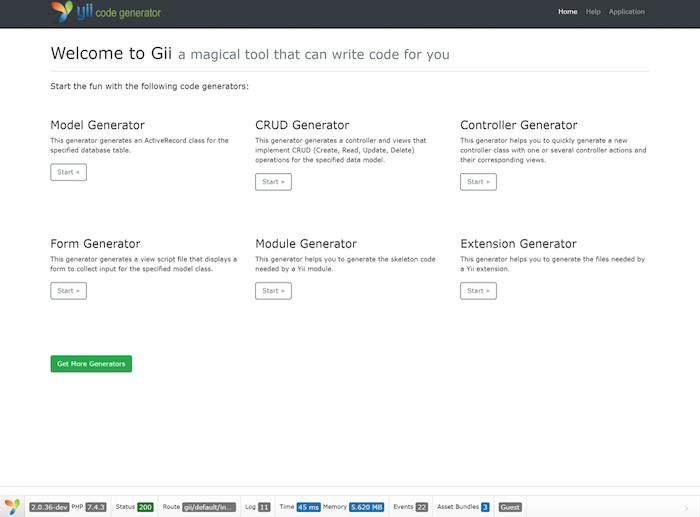
Is it a popular framework? Sure! Developers use the Yii framework for developing a huge range of tools, ranging from simple apps to scalable web services. There’s an active user community, too, so there’s always support on hand when you need it.
Bottom line? Yii is speedy, easy to install, and just as secure as the other frameworks. It’s probably the most accessible framework on this list, so give it a try if you’re unfamiliar with making PHP apps or you want to build tools fast.
5. Slim
Looking for a lean, compact framework to create basic functional apps in minutes? Slim could be the answer.
Created in 2010, Slim targets developers building smaller or more simple web services. For example, you might use Slim to build REST APIs for the web, or web apps that rely on a simple HTTP request and response model.
It’s easy to get up and running, too.
- First, install Composer.
- Then, install Slim by executing the right framework command.
- Finally, make sure you’re running the right implementation to launch Slim on your device (check out the website for help with this.)
Once you’re all set, run the “Hello World” tutorial to see just how easy it is to compose through this simple PHP framework:
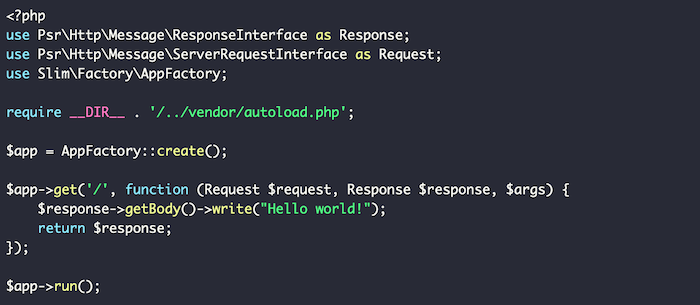
As with the other PHP frameworks, you’ll find an active user community and plenty of online documentation to help you jump in. However, what truly sets Slim apart is its sleek, simplistic template designed to create small but mighty web tools in no time.
For app developers seeking a secure PHP framework for no-frills prototyping, look no further than Slim. Don’t let the simplistic functionality fool you, though: advanced developers can add more code to make Slim web apps more dynamic.
6. Symfony
If you have some experience with PHP, or you’re building an enterprise-level app, consider Symfony. It’s simple to operate, easy to install, and gives you the freedom you need to build more complex configurations.
What’s so great about Symfony is its large library of reusable components, which means there’s no need to spend time writing repetitive code for different apps. You can just select the base code you need from the library and get going!
What’s more, you can easily link Symfony PHP frameworks with larger enterprise-level platforms like Drupal, so you can seamlessly integrate your apps into a wider content management strategy.
If you need a little help figuring out Symfony, don’t worry. There’s a whole library of text and video tutorials to walk you through everything from installation to app creation.
In short, while Symfony’s not the most accessible framework on the list, it’s exactly what more experienced developers need to build large-scale apps and web solutions. Check it out if you’re ready to take app development to the next level.
Frequently Asked Questions About PHP Frameworks
What is the purpose of using a PHP framework?
A PHP framework simplifies the process for building websites and web applications. It’s useful for anyone trying to design PHP-based apps and services to grow their business.
Is PHP popular in 2021?
Absolutely! The PHP language is advancing all the time, which means it’s sophisticated enough to handle the demands of modern web services. You’re definitely not wasting your time by learning simple PHP frameworks in 2021.
What is the best framework of PHP?
There’s no one “best” framework. The right framework for you depends on your particular business needs, and how comfortable you are with code. If you’re new to PHP, you won’t go wrong by selecting one of the frameworks we talked about earlier.
Why should I use a PHP framework?
A framework is a huge time-saver. With even a simple PHP framework, you can simplify the coding process, speed up app development times, and make your website easier to maintain in the long run. If you’re looking for an efficient app and web design approach, even for beginners, you should check out PHP frameworks.
Simple PHP Frameworks Conclusion
If you’re a web developer looking to improve efficiency without compromising code quality, you might want to try PHP frameworks.
Simple PHP frameworks are uniquely designed to help you build the apps and services you need quickly and securely, so you can focus on designing useful tools rather than wasting time on repetitive coding.
Are you still unsure where to start with PHP frameworks? Check out my consulting services to see how I can help.
Have you tried using a PHP framework yet? How easy did you find it to work with?
from Blog – Neil Patel https://ift.tt/30y3a6Y

No comments:
Post a Comment